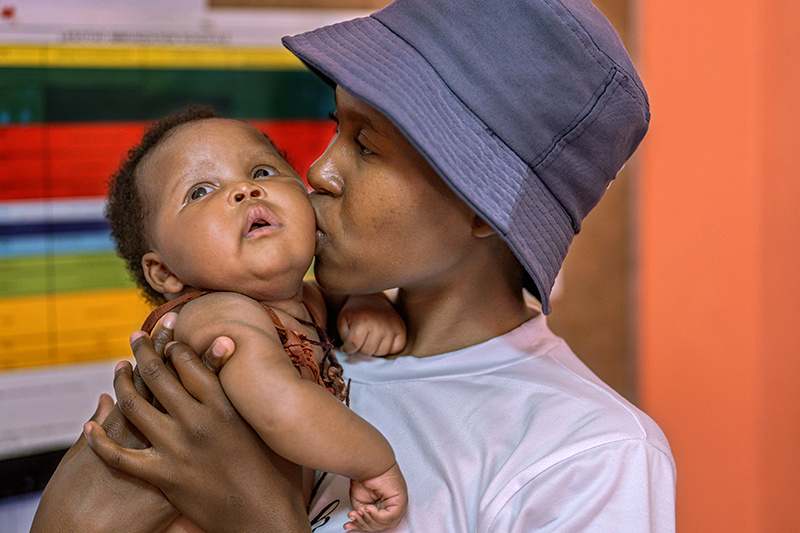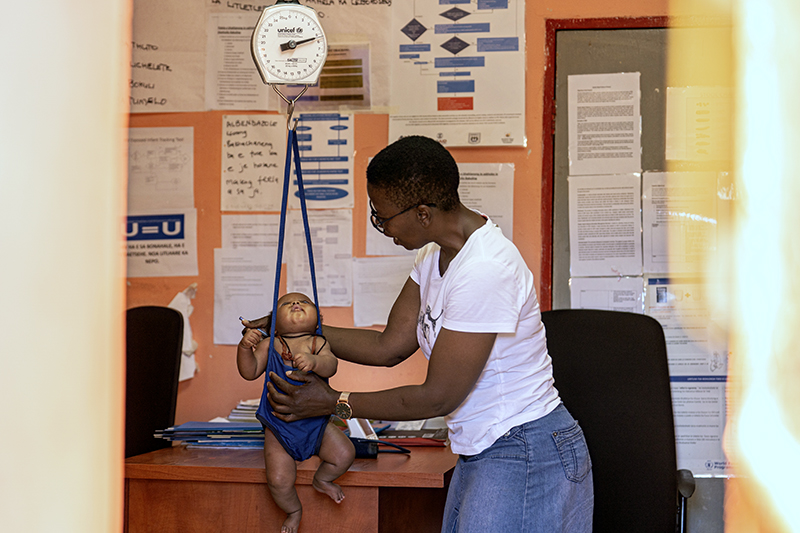Maternal Waiting Homes Provide Safe Birth and Vaccines in Lesotho
Since 2009, PIH Lesotho has included maternal waiting homes as part of a comprehensive effort to increase facility-based deliveries and reduce maternal mortality.
Posted on Apr 29, 2025

At 36 weeks pregnant, Ntsoane Mofao faced a daunting decision. Her village, situated in a remote area of Lesotho, was miles away from the nearest health facility. The paths were treacherous, especially for someone in their third trimester. Determined to ensure a safe delivery, she chose to stay at a maternal waiting home.
"I came here because I wanted to be safe," Mofao recalls of her time at the Partners In Health (PIH) Lesotho-supported facility. "The roads to Nohana Health Center are hard to travel, and I didn’t want to risk going into labor at home with no medical help."
Maternal waiting homes are residential facilities with access to qualified medical professionals. They provide a place for women from hard-to-reach areas to await their delivery, ensuring timely access to skilled midwives. This approach has been instrumental in reducing maternal and child mortality, particularly in regions with challenging terrains.
"Some women go into labor on the way to the facility because the journey is hard," notes Thandy Ketsia Tsoke, a PIH nurse-midwife at Nohana Health Center. "Others miss their check-ups because rivers are in flood." Despite these obstacles, she emphasized, "the facility strives to provide quality health care."
Like Mofao, many pregnant women in Lesotho live hours away from health facilities, often relying on untrained traditional birth attendants at home, where obstetric emergencies can quickly become fatal. To address this, PIH established maternal waiting homes at seven remote health centers in 2009, providing safe spaces for expectant mothers under medical supervision. In October, PIH Lesotho and the country’s government opened a 32-bed maternal waiting home at Lebakeng Health Center; and another home is currently under construction at Bobete Health Center.
Life at the Waiting Home: A Sanctuary for Mothers
During her stay at a maternal waiting home, Mofao received comprehensive care including regular prenatal check-ups. Beyond medical attention, the waiting home offered educational sessions on childbirth, postnatal care, and immunizations.
"I learned so much during my stay," she reflects. "Before, I didn’t fully understand why vaccines were so important, but now I know they protect my baby from diseases like measles and polio. I don’t want my child to suffer from preventable illnesses."
Ntsoane gave birth to a healthy baby girl, Nkeletseng Mohlakoana, at Nohana Health Center. She stayed at the facility for two days post-delivery, during which both mother and child were closely monitored.

"They checked my baby's weight and made sure she was feeding well," Ntsoane shares. "They also monitored my blood pressure and other vital signs to ensure I was recovering well after childbirth."
Embracing Immunization: Protecting the Future
With baby Nkeletseng in her arms, Mofao is resolute about following the recommended immunization schedule. Her time at the waiting home instilled a deep understanding of the benefits of vaccines.
"From what I learned here, if a child is not vaccinated, they can easily get sick," she asserts. "I’ve seen children suffer from measles because their parents didn’t take them for immunization. I will never let that happen to my baby."
Childhood immunizations are pivotal in protecting children and those around them from various diseases, including polio, tetanus, and diphtheria, which can have devastating effects.
"Immunizing children contributes to community immunity, making it harder for diseases to spread and protecting those who cannot be vaccinated," explains Tsoke. "This collective protection is essential in preventing outbreaks and ensuring the health of future generations."
In 2023, PIH supported the administration of 664,645 childhood vaccinations, such as hepatitis B and measles vaccines, across seven countries: Haiti, Lesotho, Liberia, Malawi, Peru, Rwanda, and Sierra Leone.
A Mother's Message: Advocating for Maternal Waiting Homes, Immunization
For Mofao and baby Nkeletseng, the journey of safe motherhood and immunization is just beginning. Their story highlights the profound impact of maternal waiting homes and the critical importance of childhood vaccinations.

"I am grateful for everything I learned here," Ntsoane says with a smile. "Because of this place, I had a safe delivery, and now my baby will grow up healthy. I encourage other pregnant women to come to the waiting home if they live far from the clinic. It can save your life and your baby’s life."
Her commitment to Nkeletseng's immunization schedule is unwavering. "My baby is my priority, and I will make sure she gets all her vaccines,” she says.

